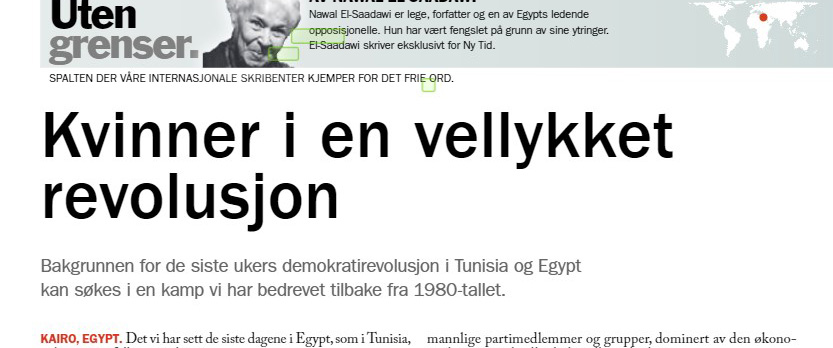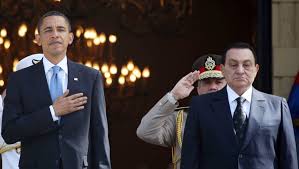(THIS ARTICLE IS MACHINE TRANSLATED by Google from Norwegian)
It seems like it was yesterday that she sat in front of us. The strong voice with the radical message was experienced as a clear contrast to the soft hotel sofa she sat on.
Exactly ten years ago, we met at the Grand Hotel in Oslo, on the occasion of March 8, 2011 and a film premiere. Egypt's authoritarian president Hosni Mubarak had been overthrown just one month earlier. But the opposition writer, doctor and feminist Nawal El-Saadawi stressed even then that it was now that the decisive battle began. In the New Time interview she pointed out that the risk was great for the democratic revolutionone should fail:
"Mubarak's men are still there, and they are working to maintain his political power. The military and the prime minister are his allies, as well as other foreign powers. We have only succeeded in removing Mubarak, the head of the system, but the body is still in perfect condition. So the fight is not over. "
She was right. A few years later, the military seized power. The brutal Al Sisi has ruled Egypt the last seven years, with tacit support from Norway and its allies.
Columnist for the "Without Borders" column
Nawal El-Saadawi was born in a village north of Cairo on October 27, 1931. When she passed away on March 21 this year, at the age of 89, she was honored for her courage and influence in large parts of the world. Last year, she was featured in Time Magazine's unique series «100 Women of the Year»- as one of the most influential people in the world in the last century.
 As editor of MODERN TIMES, I met her in Oslo, because since June 2009 she had written texts exclusively for us. At that time we were looking for one of the leading voices from the Arabic-speaking part of the world. The reason was that we then had room for a new writer in the global "Without Borders" column, created in memory of our columnist Anna Politkovskaya – the Putin-critical journalist who was killed in October 2006.
As editor of MODERN TIMES, I met her in Oslo, because since June 2009 she had written texts exclusively for us. At that time we were looking for one of the leading voices from the Arabic-speaking part of the world. The reason was that we then had room for a new writer in the global "Without Borders" column, created in memory of our columnist Anna Politkovskaya – the Putin-critical journalist who was killed in October 2006.
There was also no doubt then as to who we wanted most, and first asked, by Arabic speakers: Nawal El-Saadwai had been a leading author in Egypt ever since his debut with the collection of short stories in 1957, known in English as In Learned Love – and with the novel Memoirs of a Women Doctor (1958). She had completed her medical education a couple of years before her debut as a writer, which meant that she already had plenty of experiences to write about.
With the feminist non-fiction book Women and Sex (1972) El-Saadawi broke new ground and new taboos. She has since been an independent and power-critical voice that has stood up against injustice and discrimination. In 1981, she was imprisoned by President Anwar Sadat for his call for democracy in Egypt.
About the Bible, the Koran and Obama
In 1993, she was threatened by so-called Islamic fundamentalists, and she therefore went to the United States to teach at Duke University. El-Saadawi did not allow himself to be exploited by the forces and ideologies that tried to pit religions and most people against each other. This can be seen in interview as today's MODERN TIMES editor Truls Lie did with her – about freedom, democracy and elites.
One can also read this perspective in literary scholar Birgitte Huitfeldts conversation book Uncensored. Middle Eastern women. Ten meetings (2017), in which El-Saadawi states: «The Qur'an is much more liberal than the Bible. The Old and New Testaments are very strict towards women. The veiling of women actually came from Judaism and was later taken over by Christians and by Islam. I have studied the New and Old Testaments and the Qur'an and compared them, and the Qur'an is much more liberal towards women. "
 We can see a similar anti-dogmatic, critical and independent thinking in her first text for MODERN TIMES June 12, 2009. The relatively newly elected Barack Obama had a week earlier, June 4, delivered his great reconciliation speech in Cairo. The world looked to the future with hope, and the Nobel Committee prepared its award. But El-Saadawi saw the problems that were to come, also under Obama – beyond the 2010s. In her first column, "What Obama Forgot," she criticized him for being cowardly and apologetic: "He asked the Palestinians to forget the past and look ahead. A few days ago, he asked people in his own country to forget the torture crimes of the past and look ahead. But what is the function of the Law, if it does not exist to investigate and punish criminals? "
We can see a similar anti-dogmatic, critical and independent thinking in her first text for MODERN TIMES June 12, 2009. The relatively newly elected Barack Obama had a week earlier, June 4, delivered his great reconciliation speech in Cairo. The world looked to the future with hope, and the Nobel Committee prepared its award. But El-Saadawi saw the problems that were to come, also under Obama – beyond the 2010s. In her first column, "What Obama Forgot," she criticized him for being cowardly and apologetic: "He asked the Palestinians to forget the past and look ahead. A few days ago, he asked people in his own country to forget the torture crimes of the past and look ahead. But what is the function of the Law, if it does not exist to investigate and punish criminals? "
Not many people said that at the time in 2009. And the conclusion of her text was sharp and relentlessly honest: "The real goal of Obama's speech was to mobilize the Muslim countries against Islamic extremists, to open the Islamic countries' markets for American goods, and to guarantee Saudi and American interests in the so-called Middle East. "
A long and proud feminist tradition in Egypt
No wonder El-Saadawi became a role model for both women and men before, during and after the so-called "Arab Spring". One week before Mubarak was overthrown, she wrote this, February 4, 2011:
"Who can now guarantee that the Tunisian revolution will continue, in order to achieve freedom, dignity and justice for both Tunisia's women and men? For how many times have women not participated in popular uprisings? As in the Algerian revolution, the Palestinian, Egyptian, Lebanese, the Sudanese… »
El-Saadawi herself was aware that she was not the first or only feminist in Egypt or the region. Rather, she was one of many – albeit the most eloquent. And she stood in a proud tradition. In ancient Egypt (Kemet), women had a far more prominent and equal role than among the later Greeks – and the country had female pharaohs, as Herodotus writes. In modern times cast Huda Sha'arawi (1879–1947) unveiled at the beginning of the 1900th century, before she became central in the Egyptian Revolution of 1919 with demands for Egyptian independence from the British.
 Another feminist role model is Doria ShafiqMore (1908–1975), which in 1951 stormed the parliament in Cairo along with 1500 other feminists. The demand was increased rights for women. A few years later, women were given the right to vote.
Another feminist role model is Doria ShafiqMore (1908–1975), which in 1951 stormed the parliament in Cairo along with 1500 other feminists. The demand was increased rights for women. A few years later, women were given the right to vote.
Nawal El-Saadawi thus stood in a long and proud feminist tradition in Egypt. She also emphasized that feminism was not an invention of Europe or the United States. Feminism was, too, developed by itself in even African and Arab countries.
El-Saadawi's life and work provide inspiration across all seas and borders. It is to be hoped that her democratic work will once again be honored in her home country. Which calls for the removal of the Al-Sisi regime. For now, I and MODERN TIMES just want to say: Thank you very much!
Dag Herbjørnsrud was editor-in-chief of Ny Tid from 2005 to 2015, with the exception of one and a half years in 2006–2007. He was the editor of Nawal El-Saadawi's articles, which were published exclusively in Ny Tid from June 2009.
See one overview over most of Nawal El-Saadawi's "Without Borders" texts in New Times.
Interview with El-Saadawi in New Time March 10, 2011 (written by Rafia Zaheer):
and see MODERN TIMES's new 8 minute video interview with El-Sadaawi here.


